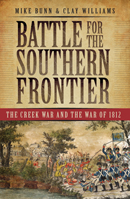Mike Bunn and Clay Williams
Battle for the Southern Frontier: The Creek War and the War of 1812
Charleston, S.C.: History Press, 2008
ISBN: 978-1-59629-371-7. 192 pp. $22.95 (US)
If you are looking for a comprehensive narrative history of the Creek War and the War of 1812 in the southern states and territories of the United States, look elsewhere.

Battle for the Southern Frontier by Mike Bunn and Clay Williamsr
But … if you want a concise overview of the related conflicts and guide to some of the sites, persons, and documents involved, this book should be in your personal library.
 Bunn and Williams sought to write an introduction to the Creek War – which helped trigger the larger, better known hostilities of the War of 1812 – and the southern campaigns of the latter. Without Andrew Jackson’s decisive defeat of hostile Creeks at the battle of Horseshoe Bend in March 1814, much of what is now Alabama and Mississippi might still remain an Indian territory; Without his crushing defeat of the British at New Orleans in January 1815, European powers might still be clinging to power on this continent.
Bunn and Williams sought to write an introduction to the Creek War – which helped trigger the larger, better known hostilities of the War of 1812 – and the southern campaigns of the latter. Without Andrew Jackson’s decisive defeat of hostile Creeks at the battle of Horseshoe Bend in March 1814, much of what is now Alabama and Mississippi might still remain an Indian territory; Without his crushing defeat of the British at New Orleans in January 1815, European powers might still be clinging to power on this continent.
To be honest, I grew up in Louisiana, but most of my “knowledge” of the Battle of New Orleans came from the old Johnny Horton song – that despite the fact that a number of my ancestors participated either in that battle or in other military actions in the Creek War and the War of 1812. I had never heard of the Creek War, other than some vague references to Horseshoe Bend.
The Battle for the Southern Frontier has given me a greater understanding of what my family faced as they moved west from the original British colonies to lands west of the Mississippi River. It has also given me a feeling for those who lost the war, especially the Creeks, Cherokee, and Choctaw who — whether they fought with or against the United States — were ultimately forced off their native lands for one farther west in what is now Oklahoma, only to lose much of that land, too, in time.
The information in the book about sites and personalities, together with its reproduction of some of the original documents regarding the conflicts, makes it possible for me, or anyone else with roots or an interest in the topic to make pilgrimages to the sites where the history was made and better appreciate the experience of those involved on either side.
If we do make those pilgrimages, this small book will prove a convenient travel companion should we need to refresh our memory on site.
– 30 –

Review: Battle for the Southern Frontier
Posted by AbyssWriter on 3/08/09 • Categorized as Book Review,Commentary
Mike Bunn and Clay Williams
Battle for the Southern Frontier: The Creek War and the War of 1812
Charleston, S.C.: History Press, 2008
ISBN: 978-1-59629-371-7. 192 pp. $22.95 (US)
If you are looking for a comprehensive narrative history of the Creek War and the War of 1812 in the southern states and territories of the United States, look elsewhere.
Battle for the Southern Frontier by Mike Bunn and Clay Williamsr
But … if you want a concise overview of the related conflicts and guide to some of the sites, persons, and documents involved, this book should be in your personal library.
To be honest, I grew up in Louisiana, but most of my “knowledge” of the Battle of New Orleans came from the old Johnny Horton song – that despite the fact that a number of my ancestors participated either in that battle or in other military actions in the Creek War and the War of 1812. I had never heard of the Creek War, other than some vague references to Horseshoe Bend.
The Battle for the Southern Frontier has given me a greater understanding of what my family faced as they moved west from the original British colonies to lands west of the Mississippi River. It has also given me a feeling for those who lost the war, especially the Creeks, Cherokee, and Choctaw who — whether they fought with or against the United States — were ultimately forced off their native lands for one farther west in what is now Oklahoma, only to lose much of that land, too, in time.
The information in the book about sites and personalities, together with its reproduction of some of the original documents regarding the conflicts, makes it possible for me, or anyone else with roots or an interest in the topic to make pilgrimages to the sites where the history was made and better appreciate the experience of those involved on either side.
If we do make those pilgrimages, this small book will prove a convenient travel companion should we need to refresh our memory on site.
– 30 –
Share this: